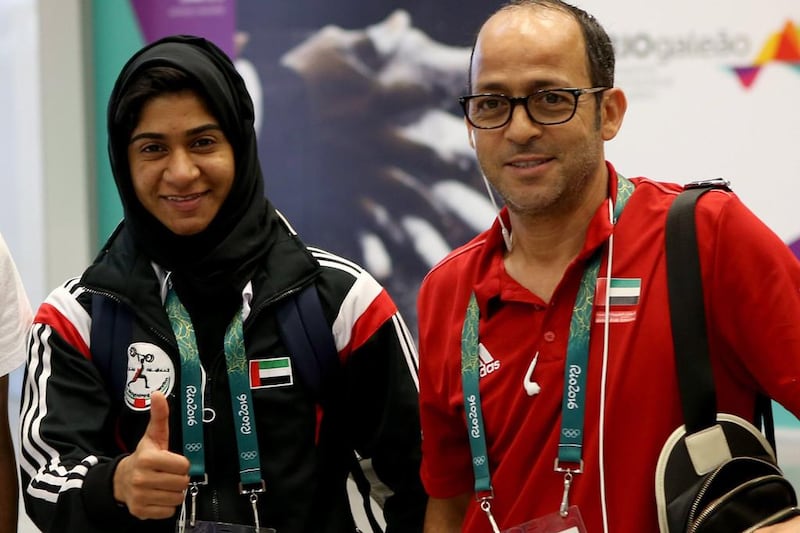Ridha Ayachi, the Tunisian coach of the UAE national weightlifting team, is hoping Aisha Al Balooshi will be able to leave her "footprint" at the Rio Olympics with a top 10 finish in the women's 58kg division.
Al Balooshi, 24, will be in action in Rio on Monday, with Group B qualifying expected to start at 7.30pm UAE time and the final expected to begin three hours later.
“We hope Aisha Al Balooshi will be able to show the required form and compete at the level of the top weightlifters in the competition here,” said Ayachi in an interview with the travelling UAE media in Rio. “This is the first Olympics for her and the atmosphere can do funny things to people, but Aisha is determined to make UAE proud and leave her footprint on the Games and make this maiden Olympics appearance a memorable one.”
Both Al Balooshi and Ayachi, of course, are realistic about their chances in Rio, but the coach is hoping these Olympic Games will be the start of a golden journey for the Emirati weightlifter, who has already won 13 gold medals, six silvers and four bronzes in various regional and Arab championships.
More Olympics
• Five to watch Day 2: UAE's Yaqoub Al Saadi and USA's Michael Phelps hit the pool
“Of course, we are not aspiring to compete for a medal here, though we know Aisha is one of the best in the Arab world and West Asia. Our aspirations are more realistic – we are looking to finish among the top 10, which would be an achievement on her first participation in the Olympics.
“After the Olympics, we have many plans and many objectives we would like to achieve, like winning a gold medal at the Arab and West Asia championships. So the Rio Games are the start of a journey, not the end. We will take the experience from here and work even harder to achieve good results at next year’s World Championships.”
Ayachi has also called for greater support for weightlifting in the country and long-term plans if the UAE hope to translate their Arab and West Asian successes into Olympic or World Championship medals.
“We need to think long-term. Suppose, if we aspire to win a medal at the 2024 Olympics, then we need to start now because it is a minimum eight-year process,” he said. “We are doing well at the Arab and West Asia level, but the World Championships and the Olympics are a completely different level, and you cannot rely on just one or two weightlifters. You need a big pool to choose from and this is true of not just weightlifting, but any sport.
“We have the talent in the country, but the problem is the lack of clubs and that is the biggest obstacle because you need clubs, regular tournaments and lots of competition between players; we cannot just limit ourselves to daily training.
“We need to start early as well, get children in the 10-11 age group, because it is difficult working with 18 years old.
“The UAE Weightlifting Federation are doing a great job and we have been focusing on schools, but it is difficult convincing the parents because weightlifting is not very popular and they want to see their children playing other, more popular games.
“We also have to remember weightlifting is an expensive sport. A weightlifting shoe costs around $300, which is the same as, say, the shoes worn by Jamaican star Usain Bolt. The price of a bar could be as much as $5,000. The federation is doing everything within its mean, but the sport needs greater support if we aspire to reach beyond the Arab level and start achieving success on the world stage and raise the UAE flag at the world championships.”
Follow us on Twitter @NatSportUAE
Like us on Facebook at facebook.com/TheNationalSport





